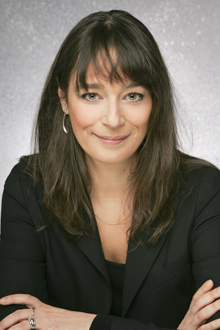Anonymous donors restore and expand Posse program for talented urban youth
Next year's participants will come from Atlanta as well as New York

Deborah Bial '87
The liberal arts Posse program for talented inner-city high school students, which was fixture at Brandeis for 12 years before being suspended for a year for financial reasons, is back in business and about to expand to Atlanta.
Restoration of the Brandeis program was made possible by anonymous donors.
The national Posse program was founded by Brandeis alumna Deborah Bial '87 to identify underprivileged inner city high school students who might not otherwise be spotted in the college admission process and provide them with a peer support network that would give them the confidence to “make it” alongside their more privileged college classmates. Selective colleges nationwide are given access to these promising recruits.
President Jehuda Reinharz thanked the "donors who have stepped forward to reinstate this valuable program, which enriches campus life." He noted that the liberal arts Posse program rejoins the ongoing Science Posse Program, which was started at Brandeis and has been underway without interruption for three years.
Posse program participants at Brandeis have always come from New York City, but that is about to change. Next fall, a science Posse of ten is due on campus from New York, but the liberal arts posse will come from Atlanta. The total number of Posse scholars currently on campus is 60.
Nationally, Posse scholars have been awarded over $334 million in full, four-year scholarships to 38 colleges and universities.
Bial, who is founder and president of the national Posse Foundation, welcomed news of the restoration of Brandeis' program. "Brandeis is special to me; the partnership is special to me," she said.
Reinharz said he feels expansion of the program into a major southern city will help expand recognition of the university “into a part of the country where the Brandeis name is less well known.”
The Posse idea grew out of an exchange Bial had with a high-achieving college student who had forfeited his full scholarship and dropped out of college because he felt he did not fit in. She says he told her, “If I had my posse with me, I might have stayed.”
The route to becoming a Posse member requires applicants to navigate one of the most highly selective scholarship competitions in the country. The Posse Foundations vets promising high school students from seven major U.S. cities: Atlanta, Boston, Chicago, Los Angeles, Miami, New York and Washington D.C. and pairs them up with the 38 participating schools. Bial said that this year there were 12,000 nominations for 480 slots nationwide. In New York City alone, the number of nominations runs into the thousands annually.
“People who think Posse is a diversity program are only getting half the story,” Bial said. “Brandeis has always understood that the leadership aspect is as important as the diversity aspect.”
Local Posse Foundation offices in each city put the large initial pool of nominees through a rigorous succession of interviews over several months, each time narrowing the field. While academic achievement is important to the process, leadership potential is paramount. The universities take part only in the final round. The college meets with the 20 finalists from one city and offers full, four-year scholarships to 10. Those 10 students form a posse.
Students who are selected spend their senior year of high school meeting regularly with their new “Posse” to get to know one another and to prepare for college. The following fall, the group enters a partner college or university as a unit and they continue to meet regularly.
“The Posse program has had an astronomical success rate,” Godsoe. The numbers bear that out. According to Godsoe, while Brandeis enjoys a high 87 percent student graduation rate, Brandeis Posse students graduate at a rate of 95 percent.
Priscilla Araya '02, who is Costa Rican and from New York City, was in the inaugural Brandeis group. She was the first in her family to travel away to a four-year college. She says it didn’t hurt that four people in her posse were not just from New York City, but from her own neighborhood, the Bronx.
Araya says that growing up she had never been exposed much to Jewish culture, and that after the Bronx, Boston suburbs were also an adjustment.
"Having my posse there was my support when I needed something from home, something familiar to me," she said. "Brandeis was an amazing fit. I was able to do research there that I couldn’t have done otherwise.”
Since graduating, she says she has seen her Posse friends go into varied fields. At least two became lawyers, two teachers, and one an educational administrator. One pursued his PhD in computer science at Brandeis and another became a professional singer.
When Araya graduated, she returned to New York and rose through the ranks of The Posse Foundation. She was program director until last Friday and is going back to school this fall. Like 45 percent of Posse college graduates, she is pursuing her master’s degree.
Bial estimates that there are at least 1,200 Posse graduates from 38 colleges and universities now in the workforce. “Posses within colleges are creating a new kind of leadership network,” Bial says.
Posse Scholars from Brandeis are leaders in the classroom and beyond. On campus, they have been inducted into Phi Beta Kappa and regularly graduate with university and departmental honors. Their campus leadership posts have included the vice presidency of the Student Union and student representative to the Board of Trustees.
Categories: Humanities and Social Sciences, Student Life





